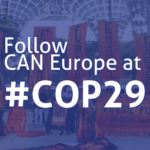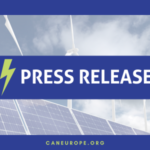MEDIA ADVISORY
This week the Commission is expected to reveal an ‘EU recovery package’ worth hundreds of billion euros, including a revamped EU budget proposal and additional funds to relaunch the economy. This a unique opportunity to invest in more resilient and sustainable economies in line with the European Green Deal and the transition towards climate neutrality.
“If there is one lesson to learn from the COVID-19 crisis, it is that today’s investments must serve to build more resilient and sustainable economies, and not return to business as usual. The Commission has repeatedly said Europe needs a green recovery, now is the time for the institution to move from words to deeds” said Wendel Trio, director of Climate Action Network (CAN) Europe.
As the recent survey by Oxford University showed, senior economists worldwide agree that green stimulus measures are among the most beneficial for the economy, as well as having strong potential to cut greenhouse gas emissions.
While opting for clear green conditionalities on stimulus spending, governments will not only ensure the best pathway for economic recovery and job creation, they will also reduce the risks for devastating economic disruptions as a consequence of increased climate change. These costs for the EU alone are estimated by the EU’s Joint Research Centre at 175 billion euros a year (equaling 1.4% of GDP) for the 3°C world we are heading towards with current policies. Welfare losses in Southern and Eastern Europe would even be double the average.
Hence, whereas the European Commission repeatedly insisted that the European Green Deal has to be the blueprint for EU economic recovery, details on how climate and environmental protection requirements would be implemented in the ‘EU recovery package’ are crucial.
As the next long-term EU budget will be the main instrument of the recovery, the overall climate action spending target must increase to 40% and not one cent should be used to support fossil fuels nor fossil fuel infrastructure. These climate safeguards must also apply to all newly created funds. The recovery spending plans elaborated at national level will have to enshrine climate neutrality, and benefiting big businesses should in turn commit to concrete decarbonisation plans.
EU funding for regional development will play a major role in the recovery. However its current climate performance is rather sobering, with little funding going to clean energy, while fossil fuels still receive EU subsidies (1). To unleash the transformational potential of EU regional development funding right from the beginning, the upfront earmarking towards the ‘green and just transition’ must increase to 40% and fossil gas must be excluded.
Trio added: “Strong climate provisions of the EU budget must not be sacrificed for the sake of short-term priorities. A sustainable relaunch of the economy to meet the Green Deal objectives requires a stable and ambitious regulatory framework as well as genuine green investment conditionalities. This is key to allow the bloc to increase its greenhouse gas emission reduction target to 65% by 2030 and reach climate neutrality by 2040 to stay in line with the 1.5°C goal of the Paris Agreement.”
ENDS
Contact:
Nicolas Derobert, Head of communications, nicolas@caneurope.org, +32 483 62 18 88
Note to editors:
(1) The report “Funding climate and energy transition in the EU: the untapped potential of regional funds” shows that in the current EU budget cycle 2014-2020, only an average of 9,7% of Cohesion Policy (infrastructure relevant) funding has been invested in clean energy solutions.
Climate Action Network (CAN) Europe is Europe’s leading NGO coalition fighting dangerous climate change. With over 170 member organisations active in 38 European countries, representing over 1.500 NGOs and more than 47million citizens, CAN Europe promotes sustainable climate, energy and development policies throughout Europe.



